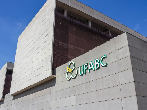Banca de QUALIFICAÇÃO: MICHAEL FRANZ SCHMIDLEHNER
Uma banca de QUALIFICAÇÃO de DOUTORADO foi cadastrada pelo programa.STUDENT : MICHAEL FRANZ SCHMIDLEHNER
DATE: 10/12/2024
TIME: 10:00
LOCAL: Banca remota: https://meet.google.com/azi-xnec-czj
TITLE:
The Foreclosure of Nature: an investigation into the society-nature relationship in late capitalism
PAGES: 160
BIG AREA: Ciências Humanas
AREA: Filosofia
SUMMARY:
The starting point of this study are the environmental and climate policies implemented increasingly over the last two decades, which are largely based on the financialisation of nature and are commonly represented by the term Green Economy. The far-reaching discursive and socio-economic changes brought about by these policies suggest a fundamental transformation in the society-nature relationship. Based on this assumption, this relationship is analysed using discourse and psychoanalytic terminology. Nature is understood here as a discursive construction and is analysed according to the three Lacanian registers of the Imaginary, the Symbolic and the Real. Based on Lacan's theory of discourse, developed from 1969 onwards, and on the concept of the Domination of Nature formulated by Adorno and Horkheimer in Dialectic of Enlightenment, it is proposed that imaginary nature constitutes the fundamental fantasy of modern subjectivity. The signifier Nature, on the other hand, functions as the founding element of the modern symbolic order. In its function of limiting the modern subject, it corresponds to what Lacan calls the Name-of-the-Father. The conflict between the unlimited growth of capital and the planetary limits that arises from this condition, as well as the incipient real and catastrophic irruption of nature that threatens our existence and that of other living beings, give rise to various psychic defence mechanisms and discursive productions that correspond to them. It is shown that the discursive strand that produces the Green Economy harbours elements that point to the mechanism of Foreclosure and has structural affinities with the Discourse of the Capitalist described by Lacan. The intent of unrestricted generalisation of the logic of capital that characterises this discourse, as well as the dissolution of social bonds caused by it, make it identifiable as an expression of a social pathology in the broader context of post-modernity. Finally, alternative imaginary constructions and possibilities for repositioning in the symbolic order are considered, which can help prevent the destructive and self-destructive processes that are heralded by the Green Economy and can subsidise the strategies of the social movements that oppose it.
COMMITTEE MEMBERS:
Presidente - Interno ao Programa - 2249486 - SILVIO RICARDO GOMES CARNEIRO
Membro Titular - Examinador(a) Externo à Instituição - ALENKA ZUPANCIC ZERDIN
Membro Titular - Examinador(a) Externo à Instituição - VLADIMIR PINHEIRO SAFATLE
Membro Suplente - Examinador(a) Interno ao Programa - 1228901 - ALEXIA CRUZ BRETAS
Membro Suplente - Examinador(a) Externo à Instituição - CHRISTIAN INGO LENZ DUNKER




